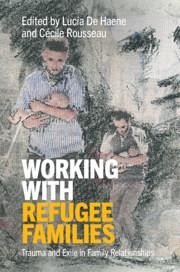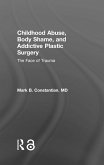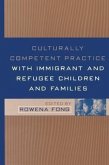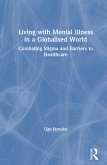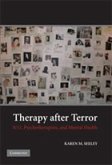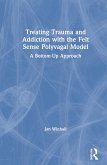Working with Refugee Families
Trauma and Exile in Family Relationships
Herausgeber: de Haene, Lucia; Rousseau, Cécile
Working with Refugee Families
Trauma and Exile in Family Relationships
Herausgeber: de Haene, Lucia; Rousseau, Cécile
- Gebundenes Buch
- Merkliste
- Auf die Merkliste
- Bewerten Bewerten
- Teilen
- Produkt teilen
- Produkterinnerung
- Produkterinnerung
This important new book explores how to support refugee family relationships in promoting post-trauma recovery and adaptation in exile.
Andere Kunden interessierten sich auch für
![Childhood Abuse, Body Shame, and Addictive Plastic Surgery Childhood Abuse, Body Shame, and Addictive Plastic Surgery]() Mark B ConstantianChildhood Abuse, Body Shame, and Addictive Plastic Surgery187,99 €
Mark B ConstantianChildhood Abuse, Body Shame, and Addictive Plastic Surgery187,99 €![Culturally Competent Practice with Immigrant and Refugee Children and Families Culturally Competent Practice with Immigrant and Refugee Children and Families]() Rowena Fong (ed.)Culturally Competent Practice with Immigrant and Refugee Children and Families51,99 €
Rowena Fong (ed.)Culturally Competent Practice with Immigrant and Refugee Children and Families51,99 €![Living with Mental Illness in a Globalised World Living with Mental Illness in a Globalised World]() Ugo IkwukaLiving with Mental Illness in a Globalised World176,99 €
Ugo IkwukaLiving with Mental Illness in a Globalised World176,99 €![Therapy After Terror Therapy After Terror]() Karen M SeeleyTherapy After Terror45,99 €
Karen M SeeleyTherapy After Terror45,99 €![Horrific Traumata Horrific Traumata]() William M ClementsHorrific Traumata139,99 €
William M ClementsHorrific Traumata139,99 €![Treating Trauma and Addiction with the Felt Sense Polyvagal Model Treating Trauma and Addiction with the Felt Sense Polyvagal Model]() Jan WinhallTreating Trauma and Addiction with the Felt Sense Polyvagal Model170,99 €
Jan WinhallTreating Trauma and Addiction with the Felt Sense Polyvagal Model170,99 €![The Notebook of a New Clinical Neuropsychologist The Notebook of a New Clinical Neuropsychologist]() Rudi CoetzerThe Notebook of a New Clinical Neuropsychologist187,99 €
Rudi CoetzerThe Notebook of a New Clinical Neuropsychologist187,99 €-
-
-
This important new book explores how to support refugee family relationships in promoting post-trauma recovery and adaptation in exile.
Hinweis: Dieser Artikel kann nur an eine deutsche Lieferadresse ausgeliefert werden.
Hinweis: Dieser Artikel kann nur an eine deutsche Lieferadresse ausgeliefert werden.
Produktdetails
- Produktdetails
- Verlag: Cambridge University Press
- Seitenzahl: 358
- Erscheinungstermin: 17. September 2020
- Englisch
- Abmessung: 237mm x 158mm x 22mm
- Gewicht: 714g
- ISBN-13: 9781108429030
- ISBN-10: 1108429033
- Artikelnr.: 59366278
- Herstellerkennzeichnung
- Libri GmbH
- Europaallee 1
- 36244 Bad Hersfeld
- gpsr@libri.de
- Verlag: Cambridge University Press
- Seitenzahl: 358
- Erscheinungstermin: 17. September 2020
- Englisch
- Abmessung: 237mm x 158mm x 22mm
- Gewicht: 714g
- ISBN-13: 9781108429030
- ISBN-10: 1108429033
- Artikelnr.: 59366278
- Herstellerkennzeichnung
- Libri GmbH
- Europaallee 1
- 36244 Bad Hersfeld
- gpsr@libri.de
Introduction. Working with refugee families Lucia De Haene and Cécile
Rousseau; Part I. Refugee Family Relationships: Coping with Trauma and
Exile: 1. The role of family functioning in refugee child and adult mental
health Matthew Hodes and Nasima Hussain; 2. Transgenerational trauma
transmission in refugee families: the role of traumatic suffering,
attachment representations, and parental caregiving Nina Dalgaard, Marie
Høgh Thøgersen and Karin Riber; 3. Pre- and post-migration trauma and
adversity: sources of resilience and family coping among West African
refugee families Aïcha Cissé, Lucia De Haene, Eva Keatley and Andrew
Rasmussen; 4. Cultural belonging and political mobilization in refugee
families: an exploration of the role of collective identifications in
post-trauma reconstruction within family relationships Ruth Kevers and
Peter Rober; 5. Forced separation, ruptured kinship and transnational
family Ditte Shapiro and Edith Montgomery; 6. Family relationships and
intra-family expectations in unaccompanied young refugees Ilse Derluyn and
Winny Ang; Part II. Trauma Care For Refugee Families: 7. Mobilizing
resources in multifamily groups Trudy Mooren and Julia Bala; 8. Working
through trauma and restoring security in refugee parent-child relationships
Mayssa El Husseini, Elisabetta Dozio, Malika Mansouri, Marion Feldman and
Marie Rose Moro; 9. Trauma narration in family therapy with refugees:
working between silence and story in supporting a meaningful engagement
with family trauma history Lucia De Haene, Peter Adriaenssens, Nele
Deruddere and Peter Rober; 10. Exile and belonging: negotiating identity,
acculturation and trauma in refugee families Jaswant Guzder; 11. Working
with spirituality in refugee care: ACT-Buddhism group for Cambodian
Canadian refugees Kenneth Fung, Mony Mok and Vireak Phorn; 12.
Collaborating with refugee families on dynamics of intra-family violence
Kjerstin Almqvist; 13. Supporting refugee family reunification in exile
Nora Sveaass and Sissel Reichelt; 14. Diagnosis as advocacy: medico-legal
reports in refugee family care Debra Stein, Priyadarshani Raju and Lisa
Andermann; 15. Reflexivity in the every-day lives and work of refugees and
therapists Rukiya Jemmott and Inga-Britt Krause; Part III. Intersectoral
Psychosocial Interventions in Working with Refugee Families: 16. Rebuilding
trust and connectedness in exile: the role of health and social
institutions Radhika Santhanam-Martin; 17. Family-school relationships in
supporting refugee children's school trajectories Mina Fazel and Aoife
O'Higgins; 18. Collaborative mental health care for refugee families in
school context Garine Papazian-Zohrabian, Caterina Mamprin, Alyssa
Turpin-Samson and Vanessa Lemire; 19. Interrogating legality and legitimacy
in the post migratory context: working around traumatic repetition and
re-enactment with refugee families Cécile Rousseau; Conclusion. Amplifying
our engagement with refugee families beyond the therapeutic space Cécile
Rousseau and Lucia De Haene.
Rousseau; Part I. Refugee Family Relationships: Coping with Trauma and
Exile: 1. The role of family functioning in refugee child and adult mental
health Matthew Hodes and Nasima Hussain; 2. Transgenerational trauma
transmission in refugee families: the role of traumatic suffering,
attachment representations, and parental caregiving Nina Dalgaard, Marie
Høgh Thøgersen and Karin Riber; 3. Pre- and post-migration trauma and
adversity: sources of resilience and family coping among West African
refugee families Aïcha Cissé, Lucia De Haene, Eva Keatley and Andrew
Rasmussen; 4. Cultural belonging and political mobilization in refugee
families: an exploration of the role of collective identifications in
post-trauma reconstruction within family relationships Ruth Kevers and
Peter Rober; 5. Forced separation, ruptured kinship and transnational
family Ditte Shapiro and Edith Montgomery; 6. Family relationships and
intra-family expectations in unaccompanied young refugees Ilse Derluyn and
Winny Ang; Part II. Trauma Care For Refugee Families: 7. Mobilizing
resources in multifamily groups Trudy Mooren and Julia Bala; 8. Working
through trauma and restoring security in refugee parent-child relationships
Mayssa El Husseini, Elisabetta Dozio, Malika Mansouri, Marion Feldman and
Marie Rose Moro; 9. Trauma narration in family therapy with refugees:
working between silence and story in supporting a meaningful engagement
with family trauma history Lucia De Haene, Peter Adriaenssens, Nele
Deruddere and Peter Rober; 10. Exile and belonging: negotiating identity,
acculturation and trauma in refugee families Jaswant Guzder; 11. Working
with spirituality in refugee care: ACT-Buddhism group for Cambodian
Canadian refugees Kenneth Fung, Mony Mok and Vireak Phorn; 12.
Collaborating with refugee families on dynamics of intra-family violence
Kjerstin Almqvist; 13. Supporting refugee family reunification in exile
Nora Sveaass and Sissel Reichelt; 14. Diagnosis as advocacy: medico-legal
reports in refugee family care Debra Stein, Priyadarshani Raju and Lisa
Andermann; 15. Reflexivity in the every-day lives and work of refugees and
therapists Rukiya Jemmott and Inga-Britt Krause; Part III. Intersectoral
Psychosocial Interventions in Working with Refugee Families: 16. Rebuilding
trust and connectedness in exile: the role of health and social
institutions Radhika Santhanam-Martin; 17. Family-school relationships in
supporting refugee children's school trajectories Mina Fazel and Aoife
O'Higgins; 18. Collaborative mental health care for refugee families in
school context Garine Papazian-Zohrabian, Caterina Mamprin, Alyssa
Turpin-Samson and Vanessa Lemire; 19. Interrogating legality and legitimacy
in the post migratory context: working around traumatic repetition and
re-enactment with refugee families Cécile Rousseau; Conclusion. Amplifying
our engagement with refugee families beyond the therapeutic space Cécile
Rousseau and Lucia De Haene.
Introduction. Working with refugee families Lucia De Haene and Cécile
Rousseau; Part I. Refugee Family Relationships: Coping with Trauma and
Exile: 1. The role of family functioning in refugee child and adult mental
health Matthew Hodes and Nasima Hussain; 2. Transgenerational trauma
transmission in refugee families: the role of traumatic suffering,
attachment representations, and parental caregiving Nina Dalgaard, Marie
Høgh Thøgersen and Karin Riber; 3. Pre- and post-migration trauma and
adversity: sources of resilience and family coping among West African
refugee families Aïcha Cissé, Lucia De Haene, Eva Keatley and Andrew
Rasmussen; 4. Cultural belonging and political mobilization in refugee
families: an exploration of the role of collective identifications in
post-trauma reconstruction within family relationships Ruth Kevers and
Peter Rober; 5. Forced separation, ruptured kinship and transnational
family Ditte Shapiro and Edith Montgomery; 6. Family relationships and
intra-family expectations in unaccompanied young refugees Ilse Derluyn and
Winny Ang; Part II. Trauma Care For Refugee Families: 7. Mobilizing
resources in multifamily groups Trudy Mooren and Julia Bala; 8. Working
through trauma and restoring security in refugee parent-child relationships
Mayssa El Husseini, Elisabetta Dozio, Malika Mansouri, Marion Feldman and
Marie Rose Moro; 9. Trauma narration in family therapy with refugees:
working between silence and story in supporting a meaningful engagement
with family trauma history Lucia De Haene, Peter Adriaenssens, Nele
Deruddere and Peter Rober; 10. Exile and belonging: negotiating identity,
acculturation and trauma in refugee families Jaswant Guzder; 11. Working
with spirituality in refugee care: ACT-Buddhism group for Cambodian
Canadian refugees Kenneth Fung, Mony Mok and Vireak Phorn; 12.
Collaborating with refugee families on dynamics of intra-family violence
Kjerstin Almqvist; 13. Supporting refugee family reunification in exile
Nora Sveaass and Sissel Reichelt; 14. Diagnosis as advocacy: medico-legal
reports in refugee family care Debra Stein, Priyadarshani Raju and Lisa
Andermann; 15. Reflexivity in the every-day lives and work of refugees and
therapists Rukiya Jemmott and Inga-Britt Krause; Part III. Intersectoral
Psychosocial Interventions in Working with Refugee Families: 16. Rebuilding
trust and connectedness in exile: the role of health and social
institutions Radhika Santhanam-Martin; 17. Family-school relationships in
supporting refugee children's school trajectories Mina Fazel and Aoife
O'Higgins; 18. Collaborative mental health care for refugee families in
school context Garine Papazian-Zohrabian, Caterina Mamprin, Alyssa
Turpin-Samson and Vanessa Lemire; 19. Interrogating legality and legitimacy
in the post migratory context: working around traumatic repetition and
re-enactment with refugee families Cécile Rousseau; Conclusion. Amplifying
our engagement with refugee families beyond the therapeutic space Cécile
Rousseau and Lucia De Haene.
Rousseau; Part I. Refugee Family Relationships: Coping with Trauma and
Exile: 1. The role of family functioning in refugee child and adult mental
health Matthew Hodes and Nasima Hussain; 2. Transgenerational trauma
transmission in refugee families: the role of traumatic suffering,
attachment representations, and parental caregiving Nina Dalgaard, Marie
Høgh Thøgersen and Karin Riber; 3. Pre- and post-migration trauma and
adversity: sources of resilience and family coping among West African
refugee families Aïcha Cissé, Lucia De Haene, Eva Keatley and Andrew
Rasmussen; 4. Cultural belonging and political mobilization in refugee
families: an exploration of the role of collective identifications in
post-trauma reconstruction within family relationships Ruth Kevers and
Peter Rober; 5. Forced separation, ruptured kinship and transnational
family Ditte Shapiro and Edith Montgomery; 6. Family relationships and
intra-family expectations in unaccompanied young refugees Ilse Derluyn and
Winny Ang; Part II. Trauma Care For Refugee Families: 7. Mobilizing
resources in multifamily groups Trudy Mooren and Julia Bala; 8. Working
through trauma and restoring security in refugee parent-child relationships
Mayssa El Husseini, Elisabetta Dozio, Malika Mansouri, Marion Feldman and
Marie Rose Moro; 9. Trauma narration in family therapy with refugees:
working between silence and story in supporting a meaningful engagement
with family trauma history Lucia De Haene, Peter Adriaenssens, Nele
Deruddere and Peter Rober; 10. Exile and belonging: negotiating identity,
acculturation and trauma in refugee families Jaswant Guzder; 11. Working
with spirituality in refugee care: ACT-Buddhism group for Cambodian
Canadian refugees Kenneth Fung, Mony Mok and Vireak Phorn; 12.
Collaborating with refugee families on dynamics of intra-family violence
Kjerstin Almqvist; 13. Supporting refugee family reunification in exile
Nora Sveaass and Sissel Reichelt; 14. Diagnosis as advocacy: medico-legal
reports in refugee family care Debra Stein, Priyadarshani Raju and Lisa
Andermann; 15. Reflexivity in the every-day lives and work of refugees and
therapists Rukiya Jemmott and Inga-Britt Krause; Part III. Intersectoral
Psychosocial Interventions in Working with Refugee Families: 16. Rebuilding
trust and connectedness in exile: the role of health and social
institutions Radhika Santhanam-Martin; 17. Family-school relationships in
supporting refugee children's school trajectories Mina Fazel and Aoife
O'Higgins; 18. Collaborative mental health care for refugee families in
school context Garine Papazian-Zohrabian, Caterina Mamprin, Alyssa
Turpin-Samson and Vanessa Lemire; 19. Interrogating legality and legitimacy
in the post migratory context: working around traumatic repetition and
re-enactment with refugee families Cécile Rousseau; Conclusion. Amplifying
our engagement with refugee families beyond the therapeutic space Cécile
Rousseau and Lucia De Haene.

